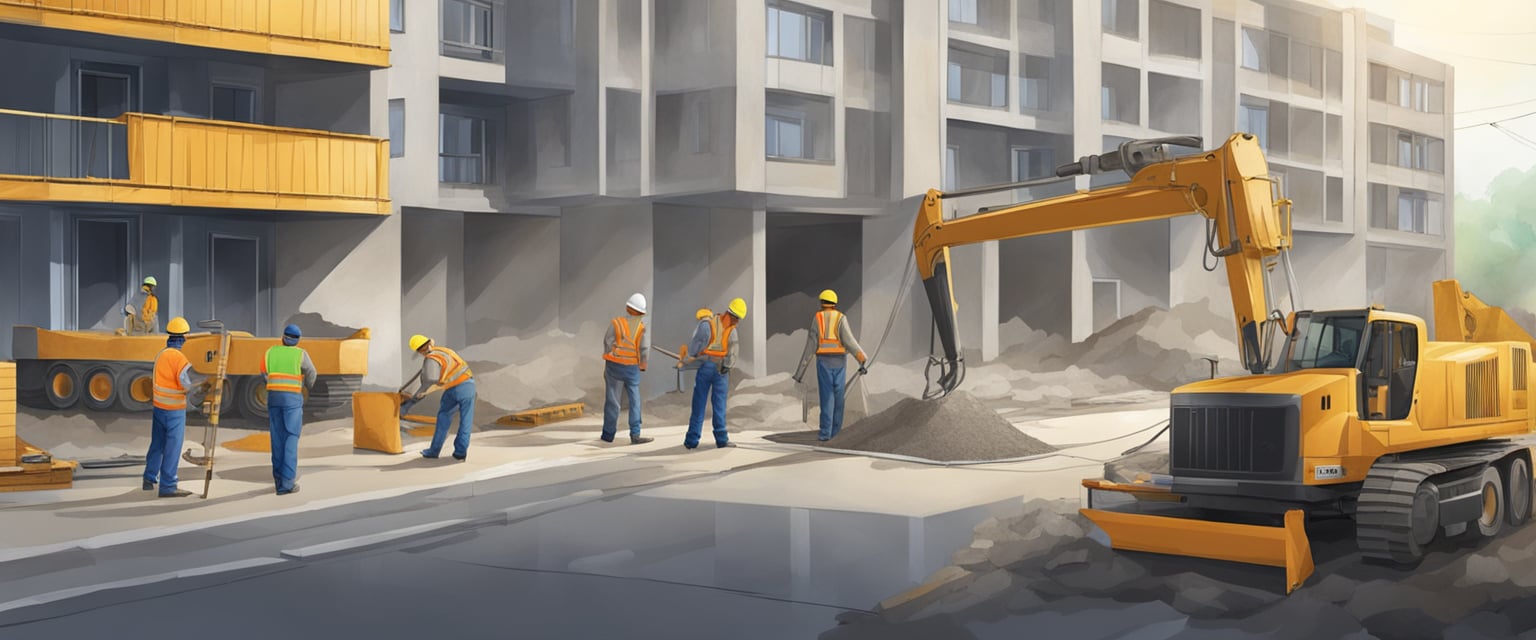Concrete Contractors: Hiring Tips for Durable Infrastructure
When undertaking any construction or renovation project, the importance of hiring the right concrete contractor cannot be overstated. Concrete contractors have the expertise to handle a wide array of projects, from laying a new driveway or foundation to crafting intricate decorative concrete work. They are skilled professionals who bring technical knowledge, experience, and precision to ensure that your concrete project meets all structural requirements and aesthetic objectives.

Selecting a proficient concrete contractor is crucial as concrete work serves as the foundation for many other aspects of building and construction projects. With a proper understanding of concrete mixtures, reinforcement, and finishing techniques, a contractor ensures the durability and longevity of the structure. Additionally, they can offer valuable advice on the most appropriate methods and materials for your specific job. Moreover, ongoing maintenance and repairs are often managed by the original contractor, keeping your concrete installations in top condition over the years.
Key Takeaways
- Hiring the right concrete contractor is essential for successful construction and renovation projects.
- Expertise in concrete installation is crucial for structural integrity and aesthetics.
- Proper maintenance and repairs are vital for the longevity of concrete applications.
Understanding Concrete Contracting
Concrete contractors are pivotal players in the construction field, specializing in the pouring, finishing, and installation of concrete for a variety of projects. These may range from small residential jobs to massive commercial undertakings. A concrete company often manages a project from the initial mixing of concrete to its reinforcement and final curing process.
The responsibilities of concrete contractors include:
- Evaluating the project site to understand requirements
- Selecting the appropriate concrete mix
- Managing the delivery of materials
- Supervising the pouring process
- Ensuring that concrete is leveled, smoothed, and finished properly
Concrete companies may also engage in designing and constructing various types of flatwork, which includes horizontal surfaces such as:
- Slabs
- Floors
- Sidewalks
- Patios
These entities carry out tasks that require precise measurement and a thorough knowledge of construction principles to ensure structural integrity and compliance with regulations. It’s a field that demands robust physical labor paired with a keen attention to detail.
In the concrete industry, timing and quality control are crucial components. Concrete must be poured and worked on before it sets, and contractors must diligently monitor the elements to prevent flaws in the finished product.
While they can tackle a wide range of tasks, concrete contractors often collaborate with other professionals in specialized materials and techniques, such as decorative concrete or high-strength formulations, to deliver the best outcomes for their clients.
Planning Your Project
.
Effective planning is essential for successful concrete projects, whether it’s for a residential driveway or a commercial patio. This section walks through the steps of identifying needs, designing, cost assessment, material selection, scheduling, and navigating permits and regulations.
Assessing Your Needs
One should begin by evaluating the scope of the concrete project. For residential needs, this may involve considering a new concrete driveway or patio, while commercial projects might require more extensive concrete slabs for parking spaces or outdoor spaces.
Design Considerations
The design phase should reflect both functionality and aesthetics. Choices include colors and textures that can be achieved through stamped concrete or concrete pavers, ensuring the chosen design complements the surrounding environment and serves its intended purpose efficiently.
Cost Estimation
An accurate cost estimate is crucial. It covers the concrete cost per square foot and factors in concrete pricing fluctuations in the Houston area. The estimate should also account for concrete delivery fees and additional costs such as a specialized cement mix for enhanced durability.
Selecting Materials
It is important to select the right materials, ensuring they are appropriate for the project’s demands. Durable materials suitable for long-term use include high-quality cement and reinforcement options, which might involve higher upfront costs but result in lower maintenance expenses.
Scheduling and Timelines
Clear scheduling and timelines are imperative for project management, accounting for phases from concrete delivery to curing. Weather conditions, labor availability, and the coordination of different construction teams must be considered to avoid delays.
Permit and Regulation Compliance
Finally, verify permit and regulation compliance. Local codes in Houston may have specific requirements for concrete sidewalks, driveway installations, or commercial spaces. Ensuring that all legal obligations are met will protect against future legal and structural issues.
Choosing a Concrete Contractor
Selecting the right concrete contractor is crucial for ensuring the durability and quality of your construction project. They should prioritize safety, efficiency, and should exhibit a high level of professionalism.
Researching Potential Contractors
One begins the search for a reputable concrete contractor by conducting thorough research. A starting point can be the Better Business Bureau (BBB), which lists accredited contractors and provides business ratings based on past performances and customer feedback. Additionally, reviewing comments and reviews from previous customers can offer insights into the reliability and quality of work provided by contractors in the vicinity. It’s advised to seek out contractors with a strong online presence and positive reviews, reflecting their commitment to customer satisfaction.
Evaluating Experience and Expertise
When assessing contractors, place a high emphasis on their experience and expertise. Experienced contractors have a track record of success that can often be evidenced by a portfolio of completed projects. Ensure they have relevant expertise in the specific type of project, whether it involves paving, foundations, or decorative cement work. Certifications and memberships in industry organizations like the American Concrete Institute may also indicate a higher level of skill and knowledge.
Comparing Quotes and Services
Once a shortlist of qualified contractors is established, they should be contacted to obtain detailed quotes. When hiring a concrete contractor, comparing these quotes is essential but focus not solely on price but the scope of services offered. Here is a simplified approach:
- Request itemized quotes to understand what’s included.
- Look for transparency in materials used and potential additional costs.
- Confirm services performed by the contractors, for example, whether they handle both installation and repair.
Ensure that the chosen contractor is not only cost-effective but also renowned for excellence and capable of meeting your specific project needs.
Concrete Installation Process

The installation of concrete foundations and surfaces is a structured process that involves meticulous preparation, precise pouring, and dedicated finishing. This process ensures that the final concrete work meets structural integrity and durability standards.
Preparation and Groundwork
Proper preparation is crucial for laying a solid concrete foundation. This stage includes the clearing of the site from grass, rocks, trees, and debris, exposing the bare earth. It often involves earth-moving equipment for efficiency, especially for large areas. The site is then leveled, and a sub-base is laid to improve the soil’s load-bearing capacity. Reinforcement, typically in the form of steel bars or mesh, is strategically placed to increase the tensile strength of the concrete foundation.
Pouring and Finishing
Once the groundwork is set, the concrete mix is poured into the designated area. Timing and consistency are vital during this phase. A uniform and smooth surface is achieved by screeding—leveling the poured concrete. Contractors then perform floating and troweling, which help compact the concrete and bring the cream to the surface, creating a durable finish. If necessary, decorative textures and patterns are also applied at this stage to enhance the visual appeal of the concrete work.
Curing and Sealing
After finishing, the concrete must cure properly, which is a critical phase that affects its ultimate strength and durability. Curing often takes a period of at least seven days. During this time, the surface should be kept moist to prevent the concrete from drying too quickly and weakening. The final step is sealing the concrete, which helps protect it against moisture, chemicals, and temperature fluctuations, preserving its look and prolonging its life.
Maintenance and Repairs
Proper maintenance and timely repairs are essential to prolong the lifespan of concrete structures such as sidewalks, driveways, retaining walls, and stairs. They ensure structural integrity and aesthetic appeal.

Routine Maintenance
For concrete surfaces, regular cleaning and resealing every few years can prevent degradation. It protects against the effects of weathering and heavy use. Retaining walls benefit from periodic inspection to detect any shifts or cracks that could compromise their structural support. Similarly, concrete stairs should be kept clear of debris and any signs of wear should be addressed promptly to avoid safety hazards.
- Cleaning & Resealing: Every 2-3 years
- Inspection: Bi-annual or after extreme weather
- Debris Removal: As necessary
Repair Strategies
Concrete resurfacing is a method used to rejuvenate and strengthen existing surfaces. It’s applicable when the underlying concrete is sound but the top layer is worn. Cracks or breaks in concrete can compromise the material’s integrity and should be mended using industry-grade fillers or sealants. When dealing with retaining walls, repairs may involve reinforcement to restore stability. Stair repairs might include patching up chipped or cracked edges, ensuring both safety and functionality.
- Resurfacing: For aesthetic improvement and surface strength
- Crack Filling: Using commercial-grade products for durability (The Driveway Company)
- Retaining Wall Reinforcement: To counteract soil pressure and environmental stress
- Stair Repairs: Focusing on structural integrity and user safety
Specialized Concrete Applications

Specialized concrete applications encompass both aesthetic and functional aspects, addressing specific needs in both residential and commercial settings. These applications involve precise methodology and must adhere to industry standards for safety and durability.
Residential Solutions
Residential concrete contractors often focus on concrete driveways and concrete sidewalks, enhancing curb appeal and functionality. High-quality installations take into account ground preparation, drainage, and the integration of decorative techniques. Residents benefit from self-consolidating concrete, an advanced solution that minimizes air pockets and enhances the durability of driveways. The application of pervious concrete in residential settings promotes effective water management, allowing rainwater to pass through the surface and reduce runoff.
- Concrete Driveways: Tailored to complement the home’s exterior, options include various finishes such as stamped or colored concrete.
- Concrete Sidewalks: Ensure safe, durable pathways with options for customization to match the aesthetic of the neighborhood or personal taste.
Commercial Applications
Commercial concrete work requires the mastery of larger-scale projects, from building foundations to asphalt paving and structural framing. Contractors in the commercial realm provide services like specialized concrete installation and reinforcements for longevity and adherence to regulations. Consider the complexities—some projects demand concrete that withstands heavy loads, while others necessitate a quick install with minimal disruption to business operations.
- Asphalt Paving: A cost-effective choice for large areas like parking lots, asphalt is laid quickly and has a shorter curing time than concrete.
- High-Stress Applications: Incorporates post-tensioning and high-performance materials suited for industrial and commercial use.
The industry continues to advance, offering innovative applications for specialized concrete that cater to both practical and decorative needs.
Frequently Asked Questions

When considering a concrete project, individuals frequently have a set of common inquiries that can influence their decision-making process. Addressing these questions ensures that one’s choices are well-informed, catering to both quality and cost-effectiveness.
How do I find reputable concrete contractors near me?
One can find reputable concrete contractors through local directories or online platforms that offer user reviews and ratings. Credentials such as licensing and insurance, as well as any endorsements from professional bodies, are important to consider.
What services do residential concrete contractors typically offer?
Residential concrete contractors generally offer services including driveway and walkway installations, foundation work, patio construction, and various custom concrete solutions tailored to enhance the value and functionality of a home.
How should I prepare for a concrete slab installation?
Preparing for a concrete slab installation involves ensuring the workspace is clear, accessible, and properly marked for any utilities. The ground should also be level to provide a stable base for the concrete.
What factors should I consider when looking for affordable concrete services?
Searching for affordable concrete services requires considering the cost of materials, labor, and any additional features. One should request multiple estimates to compare while not compromising on the integrity and quality of the work.
What is concrete flatwork and where can it be applied?
Concrete flatwork refers to any poured surface that moves along a horizontal plane. Flatwork includes projects like sidewalks, patios, and driveways, and it is a common choice due to its durability and versatility in various settings.
Who are some of the top concrete subcontractors in the United States?
Names of top concrete subcontractors in the United States are not provided in the search results. However, leading subcontractors are often recognized for their innovative techniques, commitment to sustainability, and comprehensive services that propel the industry forward.




